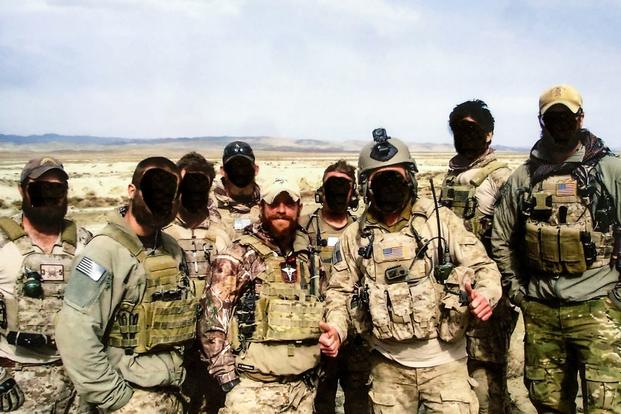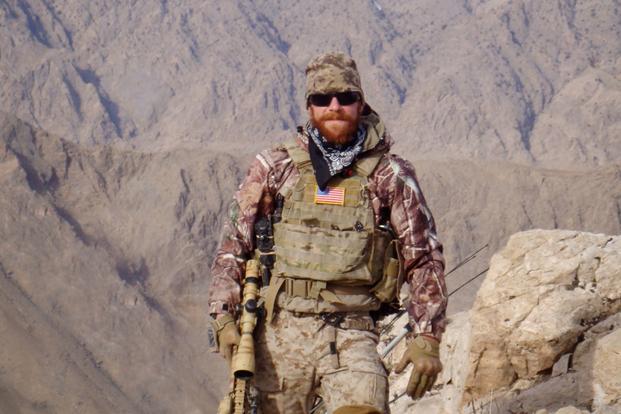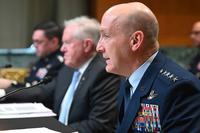Beta male. Cowards. Weak. Entitled millennials. Not real Navy SEALs.
In a new book and media appearances, that's how retired SEAL Eddie Gallagher describes the former teammates who accused him of war crimes -- including stabbing a wounded Islamic State prisoner to death and sniping at civilians -- during a tumultuous deployment to Iraq in 2017.
Nearly two years after his acquittal at court-martial on most charges -- he was found guilty of posing for a photo with the prisoner's corpse -- Chief Petty Officer Gallagher is out to set the record straight, as he sees it.
But while Gallagher denies his teammates' accusations, the way he describes that prisoner's final moments of life, and the medical treatment he and his platoon provided, has raised fresh questions.
Read Next: AC-130 Gunship Crew Gets Distinguished Flying Cross, Air Medals for Saving 88 Lives in Battle
In an interview broadcast last month during the final episode of the Apple podcast "The Line," Gallagher denied stabbing the prisoner but then said, "That dude died from all the medical treatments that were done. And there was plenty of medical treatments that were done to him."
He then agreed when the host asked whether that amounted to "nursing him to death."
In a June 15 interview with Military.com, Gallagher again said, "We decided to just nurse him to death by medical procedures" when describing how the platoon treated the prisoner in his final moments.
However, he denied that any of the medical procedures, while performed for training purposes, were done to hasten the prisoner's death or against his medical interests.
Defense Secretary Lloyd Austin, when asked last month about Gallagher's comments, declined to comment but said, "I know that the Navy is looking into that issue."
When asked whether the service is considering investigating Gallagher's comments, officials have repeatedly replied that there is nothing to report.
Gallagher said neither he nor his attorney have heard from the Navy since his podcast comments.
But Gary Solis, a law of war scholar who has taught at West Point and a Marine veteran of Vietnam, said Gallagher may have admitted to a different war crime than the main one for which he was acquitted in 2019. Solis believes what Gallagher described amounts to a "grave breach" of the Geneva Conventions' prohibition against unnecessary suffering of an unlawful combatant.
In his interview with Military.com, Gallagher emphatically refuted that characterization.
Fresh Questions
Following the court-martial, Gallagher said that he and his wife Andrea chose not to disappear into civilian life but instead to "speak the truth ... and just tell exactly what happened during this whole thing."
The result is his new book, "The Man in the Arena," named for the famed Teddy Roosevelt speech about how credit is due, not to the critic, but "the man ... whose face is marred by dust and sweat and blood."
Throughout the book's nearly 430 pages, Gallagher comes across as deeply aggrieved and persecuted, and he attacks his antagonists in strikingly personal terms.
Andrea Gallagher, who writes several chapters from her perspective, compares her husband to the Old Testament's Joseph, who was betrayed by his brothers and sold into slavery in Egypt, only to readily forgive them years later.
But in his own chapters, Gallagher is not in the forgiving mood. He derides the SEALs who accused him -- in group chats, interviews with the Naval Criminal Investigative Service, and on the stand -- of murdering an ISIS prisoner and shooting at Iraqi civilians as the "Mean Girls" of Alpha Platoon, spreading gossip and "plotting" against him. Those SEALs called their own group chat the "Sewing Circle."
He wrote that Dalton Tolbert, a sniper in the platoon, was "one of [then-Special Operator 1st Class] Craig [Miller]'s cancerous butt buddies," who "peer pressur[ed]" other SEALs into hating Gallagher. Former Special Operator 1st Class Dylan Dille, another sniper, was a "soft beta male." And Miller was "weak-bodied," "weak-minded," and "the idiot puppet of Dille and Dalton Tolbert."
In his telling, Navy investigators, prosecutors, SEAL whistleblowers and reporters are either opportunists hoping to boost their careers by throwing him under the bus, or craven malcontents who weren't up to the rigors of combat or how Gallagher ran his platoon.
"It was about a millennial mutiny," Gallagher sums up the case against him in his book. "Not the type of mutiny back in the day on ships with swords, but one executed through text messages and whispers by a group of malcontents who would say anything to take down a boss they hated."
Gallagher also makes clear his broader dissatisfaction with the changing culture of the military and the West Coast SEAL community in particular.
"During the Obama administration, instead of focusing on winning wars and maintaining the standards for selection, a new emphasis on diversity and progressiveness had trickled down to the rank and file," he wrote. "Chiefs walked on eggshells, worried about offending the SEALs under them, fearing retaliation."
At another point in the book, Gallagher groans, "Don't get me started on the gender-neutral pronoun changes to the [SEAL] ethos" by former Naval Special Warfare Command head Rear Adm. Collin Green, who sought to strip Gallagher of his SEAL trident and clashed with former President Donald Trump over the case.
The SEALs' increasing public visibility, and the fact that some younger SEALs appeared to have a sense of entitlement and to be in it for the glory, also didn't sit right with Gallagher.
"I think some of the younger generation of SEALs -- not all; there are still plenty of pipe hitters coming up through the Teams -- have different motivations," he wrote. "I joined the military, and then the SEAL Teams, to serve my country and kill our nation's enemies. I never needed or wanted recognition for it."
When he first took charge as the chief of Team 7's Alpha Platoon, he wrote, his work was cut out for him. It had been rated the team's worst platoon, and he sought to train them hard and turn them into the best.
"Was I hard on them?" Gallagher wrote. "Yes. But the additional training paid off. We ended up ranked one of the best platoons at Team 7 during workup, which is how we earned the deployment to Mosul to fight ISIS."

In the Military.com interview, Gallagher was asked why the SEALs who accused him would, as he saw it, fabricate claims to ruin him because he was too tough on them. After all, they were SEALs as well, who had made it through the punishing Basic Underwater Demolition/SEAL training, or BUD/S, some of the most grueling training in the military. Tolbert himself later moved on to SEAL Team 6, the group of SEALs that famously carried out the raid on Osama Bin Laden’s compound in 2011.
Gallagher responded that just because they made it through BUD/S and received their trident didn't mean they were up for combat, or were even real SEALs.
"BUD/S is definitely one of the toughest selection courses in the military," he said. "But just because you go through BUD/S, just because you have enough grit to make it through, does not make you an actual SEAL. I ran a couple of marathons in my life; that does not make me a professional marathon runner. That just means I had enough grit to make it through a couple.
"This was their first actual combat deployment," Gallagher continued. "And I think because of how chaotic that deployment was, they realized that this job wasn't for them. And instead of owning that, they put that blame on me."
Gallagher said he believes that by the end of the 2017 Iraq deployment, Craig Miller and the other SEALs who accused him were discontented and "had spun themselves up so much" that they formed a "hate circle," blaming their leadership and platoon chief Gallagher in particular.
'It Got Out of Their Hands'
"These guys decided to stew on this and keep it going, and I think it got out of their hands," Gallagher said. "They were just looking to get me in trouble with the Naval Special Warfare community."
One of those SEALs, at least at first, was SO1 Corey Scott, the medic who first backed up the allegations that Gallagher stabbed and killed the prisoner and told NCIS that "you could tell he was perfectly OK with killing anybody that was moving" -- only to shock the courtroom by taking the stand and claiming he instead was the one who killed the prisoner.
Scott, who had obtained immunity for his testimony, first testified that day that Gallagher did indeed stab the prisoner but did not kill him. Under questioning from Gallagher's attorney, Scott said that he himself had put his thumb over the prisoner's breathing tube, until the prisoner asphyxiated.
When asked why he thought Scott first accused him and didn't act to quash the investigation earlier by saying something short of admitting he himself killed the prisoner, Gallagher said it was because Scott was friends with Miller and the other accusers.
But he also believes that Scott waited until he had immunity to prevent the Navy from retaliating against him.
"It was blatantly obvious that they [the Navy] were going to punish anybody that was going against their narrative," Gallagher said. "So I think that's why he waited until the actual trial to come out with it."
One of the central pieces of evidence in Gallagher's trial was a photograph of him with the prisoner's corpse, holding up a hunting knife, that he texted to a friend with the caption, "Good story behind this. Got him with my hunting knife."
To prosecutors, that was essentially a murder confession.
But in Gallagher's telling, it was "a sick joke" between friends -- the kind of pitch-black humor soldiers have always adopted on the battlefield -- that has been taken out of context and misinterpreted. When asked why he made the joke about the hunting knife getting the prisoner instead of the Hellfire missiles that obliterated the ISIS compound, Gallagher said it was because he took the picture holding the knife.
"The whole platoon posed with that dead body that day; even the accusers," he said. "Everybody was taking pictures, messing around. It was a bunch of bored SEALs waiting to be told to go back to the [forward operating base]. And that's all that was. ... That piece of evidence right there, me holding the knife, that is the best and worst piece of evidence the prosecution had."

Tests found no blood on the knife or its scabbard, only a Middle Eastern man's DNA, which could have come from anyone from the Middle East touching the knife at some point. And Gallagher pointed out that photographs do not show blood on him, which he said would not be the case if blood was spurting out of the prisoner, as Miller testified.
Gallagher said that the platoon intended to kill the ISIS fighter by calling in multiple Hellfire missiles on the compound where he and other ISIS fighters and commanders were located. The prisoner's comrades were killed, and he "was pretty much on death's door," he added.
The Iraqi Emergency Response Division also on the scene that day was an effective fighting force, but Gallagher said they were well-known to commit torture and other abuses.
"They were saying [in a video taken that day], 'Not in front of the Americans,'" he said. "Because what they were going to do -- what they always did -- is chop him up in front of us or somehow torture him and mutilate him. So we decided to just nurse him to death by medical procedures."
Solis said that statement "sounds like a confession to premeditated murder to me, never mind the admission of a war crime and a Geneva Convention grave breach."
As soon as the platoon began treating the ISIS fighter, Gallagher said, the Iraqis backed off.
Before the treatments began, according to Marine Staff Sgt. Giorgio Kirylo's testimony at trial, SEAL medic T.C. Byrne injected the prisoner with something that woke him up instead of administering the sedative ketamine, and said something to the effect of, "This guy's going to feel everything that we do to him."
In his book, Gallagher describes a series of medical treatments he and other members of the platoon performed. First, Gallagher performed a cricothyrotomy on the prisoner to establish an airway.
Gallagher said an intravenous infusion was attempted, he thinks by Byrne, but it was unsuccessful.
The platoon believed the blast might have resulted in internal bleeding in the prisoner, so Byrne established a chest tube on his left side. He was assisted by a SEAL identified as Petty Officer Victor, a junior enlisted member of the platoon who was not a medic, but who had expressed interest in attending medic training.
Gallagher said he walked away briefly to talk to the officer in charge. When he returned, a second chest tube had been attempted on the prisoner's right side, but it appeared "messed up."
"From there, it just became, this guy's going out, and every procedure after that was done for just training," Gallagher said. The decision to keep performing procedures "wasn't really vocalized [by one SEAL in particular]. ... The procedures kept going."
'That's a Very Painful Procedure'
Finally, Victor attempted an intraosseous infusion on the prisoner, in which a needle is inserted directly into a patient's bone marrow to try to infuse fluids or medications into his system. It is a highly painful procedure, typically done when a standard IV cannot be inserted into a vein.
Gallagher wrote that when Victor punched the needle through the prisoner's breastplate, there was no movement.
"I knew he was out, because that's a very painful procedure," he explained.
Gallagher said he considered the potential pain the procedure could cause the prisoner before allowing Victor to attempt it. And he said he didn't have concerns about allowing Victor, who was not a medic, to try it, because there were two other medics by his side assisting and instructing him.
Solis, a former Marine judge advocate, believes this action amounted to a confession of a war crime. The Geneva Conventions prohibit prisoners of war from being subjected to "medical or scientific experiments" that are not justified by the prisoner's medical needs, or carried out in his interest.
Solis also feels Gallagher's prosecutors badly bungled the case.
"Gallagher's 'medical treatment' of his prisoner constituted a grave breach of 1949 Geneva Convention I, Article 50, causing great suffering or serious bodily injury," he said in an email. "This includes 'exposure to useless and unnecessary suffering.' Though acquitted, Gallagher is a war criminal. I know an incompetent prosecution when I see it."
Gallagher denied that he or his platoon violated any laws of war by conducting the IO infusion, which was done at least in part to train Victor.
"It was being carried out in [the prisoner's] interest," he said. "He just happened to be dead at the time, or on his way out five to 10 seconds after [Victor] administered the IO. Every procedure that was done to him was valid, besides the [second] chest tube, which I don't know if that needed to be done or not. But every other procedure was valid."
Scott and other SEALs testified that Gallagher first helped treat the prisoner, including by administering the emergency breathing tube, but then pulled out his custom-made hunting knife and stabbed him between the neck and collarbone without explanation. Other witnesses, such as Kirylo, said Gallagher never stabbed him.
When asked whether his platoon had ever previously performed medical treatments on a prisoner for training purposes, Gallagher said a medic had done it once before, when a fighter who had been shooting at them was shot and fatally wounded. He did not say when and where that incident took place.
"Our medic at the time pretty much nursed him to death," he said. "He was going out, and instead of calling in Americans to extract one prisoner and possibly getting shot down, decided to put him out."
Gallagher said the medical treatments were not done to hasten the fighter's death, but were the procedures that needed to be done until he died.
"It was the same scenario; the fighter was going out and that was it," he said.
Despite Gallagher's comments on the podcast that the prisoner in Mosul "died from all the medical treatments that were done to him," he said in the June 15 interview that the medical treatments did not cause the death.
"What caused the [ISIS fighter's] death ... was the Hellfire missiles that they shot into the building that he was in," Gallagher said. "That's what put him on his way out. These medical procedures that were done to him just assisted that. We did our best to put him out softly. ... I did not know that T.C. Byrne had injected him with uppers. I thought maybe he gave him ketamine or something of that nature to ease the transition from life to death."
Gallagher's reaction to Dille's testimony during the court-martial on his alleged instruction about to nurse captured fighters to death was strong, as recorded in his book. Dille told the court that Gallagher, as his instructor during BUD/S training, said that if an enemy combatant was captured, "the medics know what to do to nurse him to death."
"What an absurd and outrageous statement," Gallagher wrote in the book. "At no time had I ever discussed that scenario with anyone or created some ludicrous SOP for 'nursing the enemy to death.' I figured this must have been some feeble attempt concocted with the prosecution to prove premeditation."
When asked about his acknowledgment in interviews that "nursing to death" sometimes happened, Gallagher said he never issued such an instruction.
"I've never said those words, never put out to the platoon like, 'Hey, this is what we'll do,'" he said in the interview. "Because I would never even think that scenario would happen. That's not a scenario that happens all the time."
The Elephant in the Room
Gallagher said he thinks his case -- and the lightning rod for controversy he has become -- has brought out "the elephant in the room" about the conflict over how wars should be fought.
"We've been at war now for two decades, and I think the longer we've been at war, the more armchair quarterbacking has been going on, the more the media is involved," he said. "They want to know exactly what's going on over there, exactly what everybody's doing."
Gallagher also sees a growing generational gap in the SEALs, one that erupted during his trial. He said that newer recruits don't have the same motivation or drive as those who were around when 9/11 happened or who joined because of the terrorist attacks.
"These guys that are coming in now, 9/11 is just a historical moment that happened," he said. "They don't have the same feelings or emotions about it. Which is natural, but at the same time, you're sending these two different groups over to deploy with two different mindsets."

Gallagher also sees a "line that's being drawn" between the officers and enlisted in the Teams.
"My case showed that the officers will throw you under the bus," he said. "They'll throw you away for life just to not give the institution a black eye, and I think guys saw that.
"Now, there's a lot of distrust," he continued. "Nobody's gonna have your back. Whether you're guilty or innocent, if you are being accused of something, you are guilty until you prove yourself innocent."
When asked if he has ever considered whether he may not be the good guy in this tale, Gallagher said that, when he was first imprisoned, he did a lot of thinking back over his time as chief to try to figure out why his fellow SEALs would "go to this length to put me away for life."
He acknowledged he made mistakes as a platoon leader, as all leaders do, and could have done better. But, he said, he doesn't understand why his former comrades took these steps and doesn't think he ever will.
"I went all the way from when I took over the platoon," Gallagher said of his soul-searching process, "and went through and tried to find ways, like how did I make this happen? What did I do as a leader to make them do something like this?
"I found nothing."
Correction: This story has been updated to correct a reference to the prisoner’s legal status as an unlawful combatant.
-- Stephen Losey can be reached at stephen.losey@military.com. Follow him on Twitter @StephenLosey.
Related: Gallagher Claims SEAL Platoon Agreed to Practice Medical Procedures on Dying Prisoner












